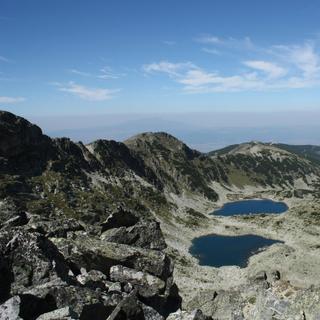
Telluride weather and climate in 2025

Telluride weather and climate in 2025
Day
23 °C
Night
4 °C
Precipitation
69 mm
in month
Rainy days
13 days
in month
Daylight
14 hours
average
Sunshine
10 hours
average
Humidity
45 %
Weather charts for Telluride


Find more destinations like this
Destinations with similar weather to Telluride
Other destinations in Colorado
Closest cities for Telluride
Last week's weather in Telluride
Average daily temperature during the week of 23 June 2025 - 29 June 2025 was 22 °C (72 °F), average minimal (night) temperature was 9 °C (48 °F). Both the daily and night temperatures in Telluride are slightly above the long-term average, which is around 20 °C (68 °F) and 1 °C (34 °F) respectively. The average temperatures observed during different times of day (based on local time) were as below: 7am 10 °C (50 °F), 10am 18 °C (64 °F), 1pm 20 °C (68 °F), 4pm 21 °C (70 °F), 7pm 21 °C (70 °F), 10pm 16 °C (61 °F).
There were 6 days without rain and 1 day with light rain during this week. Telluride received 1 mm (0.04 in) of precipitation throughout the week, which is below its long-term average of 10 mm (0.39 in). The daytime hours (from dawn to dusk) had an average cloud coverage of 30 %.
Average speed of wind was 2.8 m/s. The most common wind direction(s) were South-East and West. The air pressure varied between 1011 hpa and 1025 hpa. The average air humidity was 30 % in Telluride.
During the daytime (from dawn to dusk), there were in average: 9 hours clear skies, 3 hours partially overcast skies and 4 hours overcast skies. Average time of sunrise was 05:50, average time of sunset was 20:37.
Weather overview for Telluride
Weather overview
Telluride (United States of America) in general has a mild climate. Temperatures during the day are in the range from 2 °C (35 °F) in January to 23 °C (73 °F) in July. Temperatures during the night go from -17 °C (2 °F) in January to 4 °C (40 °F) in July. The driest month is June with just 7 days of rain, on the contrary, the month when it rains the most is August with 14 days of rain.
January weather
The minimum of the day temperature can be noticed, with its value of 2 °C (35 °F) in Telluride, and the night temperature is on its minimum too in this month. The number of rainy days descent's start could be observed, with its value of 8 days, and the rainfall amount descent's start could be observed too in this month. The number of sun hours (without clouds) starts to rise, with its value of 7 hours.
February weather
The number of rainy days starts to rise in February in Telluride. The night temperature starts to rise, with its value of -15 °C (4 °F), and the beginning of the rise of the day temperature could be noticed as well. The rise of the number of sun hours (without clouds) can be observed, with its value being 8 hours.
March weather
The rise of the number of rainy days can be observed, with its value of 10 days in Telluride, while the rainfall amount rise's start could be observed. The rise of the day temperature can be observed, with its value of 4 °C (40 °F), and the rise of the night temperature can be observed as well, with its value of -12 °C (10 °F). The number of sun hours (without clouds) continues to rise.
April weather
The number of rainy days descent's start could be observed, its value is 10 days in Telluride, and the rainfall amount starts to descent as well, the value of this measure is 54 mm (2.12 in). The day temperature rises similarly to the previous month, and the night temperature rises similarly to the previous month too, with its value of -8 °C (18 °F). The number of sun hours (without clouds) rises similarly to the previous month, its value is 9 hours. The wind speed reaches its maximum, with its value being 4.
May weather
The day temperature continues to rise, with its value being 13 °C (56 °F) in Telluride, and the rise of the night temperature can be observed as well. The descent of the number of rainy days can be observed, the value of this measure is 9 days, and the descent of the rainfall amount can be observed too, the value of this measure is 44 mm (1.74 in). The number of sun hours (without clouds) continues to rise, with its value being 10 hours.
June weather
The tourist season slowly starts in Telluride. The day temperature continues to rise, the value of this measure is 19 °C (67 °F), and the night temperature continues to rise as well, its value is 0 °C (32 °F). The minimum of the rainfall amount is observable, the value of this measure is 31 mm (1.23 in), and the minimum of the number of rainy days is observable as well, the value of this measure is 7 days. The number of sun hours (without clouds) is on its maximum.
July weather
The maximum of the day temperature is observable, the value of this measure is 23 °C (73 °F) in Telluride, and the maximum of the night temperature can be noticed as well, with its value of 4 °C (40 °F). The ongoing tourist season is noticeable. The number of rainy days starts to rise, with its value being 13 days, and the rainfall amount starts to rise as well in July. The number of sun hours (without clouds) descent's start could be observed, its value is 10 hours.
August weather
The number of rainy days reaches its maximum, with its value being 14 days in Telluride, and the maximum of the rainfall amount can be noticed too in August. The day temperature descent's start could be observed, its value is 22 °C (71 °F). The number of sun hours (without clouds) continues to descent, the value of this measure is 9 hours. The wind speed reaches its minimum in this month.
September weather
The day temperature descents similarly to the previous month in Telluride, while the beginning of the descent of the night temperature could be noticed, with its value of 1 °C (34 °F). The number of rainy days starts to descent, its value is 10 days, and the beginning of the descent of the rainfall amount could be noticed as well. The number of sun hours (without clouds) descents similarly to the previous month.
October weather
The descent of the number of rainy days can be observed, the value of this measure is 8 days in Telluride, and the rainfall amount continues to descent too, with its value of 57 mm (2.24 in). The day temperature continues to descent, the value of this measure is 13 °C (56 °F), and the night temperature continues to descent too, the value of this measure is -4 °C (25 °F). The number of sun hours (without clouds) continues to descent, its value is 8 hours.
November weather
The night temperature continues to descent, with its value being -10 °C (14 °F) in Telluride, and the day temperature continues to descent too, the value of this measure is 7 °C (44 °F). The descent of the number of sun hours (without clouds) can be observed, the value of this measure is 7 hours.
December weather
The descent of the day temperature can be observed, with its value being 2 °C (36 °F) in Telluride, and the night temperature descents similarly to the previous month too, with its value being -15 °C (5 °F). The number of sun hours (without clouds) reaches its minimum, with its value of 6 hours. The number of rainy days starts to rise in December. The minimum of the day length is observable, its value is 9 hours. The maximum of the humidity can be noticed in this month.
FAQs
How windy is it in Telluride in May?
In May in Telluride, there will be an average wind scale of 4.
What is the temperature in Telluride during the day in June?
In Telluride in June, the average daily temperatures will be 19 °C (67 °F). Nice temperature for walking around the city or on the beach, but you will probably get cold soon when wearing a swimsuit. When walking around all day, people used to cold conditions, pull out their shorts and get rid of their sweaters. On some days, when spending time in the direct sun, sunscreen can be useful, especially for people with more sensitive skin.
Is July part of the wet season in Telluride?
No, there is no wet season in Telluride in July - you can expect 13 days of rain during the month.
What is the night temperature in August in Telluride?
The average night temperature in August in Telluride is 4 °C (39 °F). The nights will be cool, layers of clothes will be needed for evening and morning walks, the hotel should be equipped with heating.
Are there good conditions to visit in Telluride in September?
Telluride can be visited in September - the weather will be moderate. The night temperature of 1 °C (34 °F) is not inviting for evening and night activities except for visiting a bar and having beer or two.
How many rainy days can I expect in Telluride in October?
There are 8 days, which are rainy in Telluride in October, that is, days with precipitation more than 2 mm (0.08 in). Converted to days of the week, this means that it will occur on an average of 1.8 days of the week, or in general - 26 % days.











